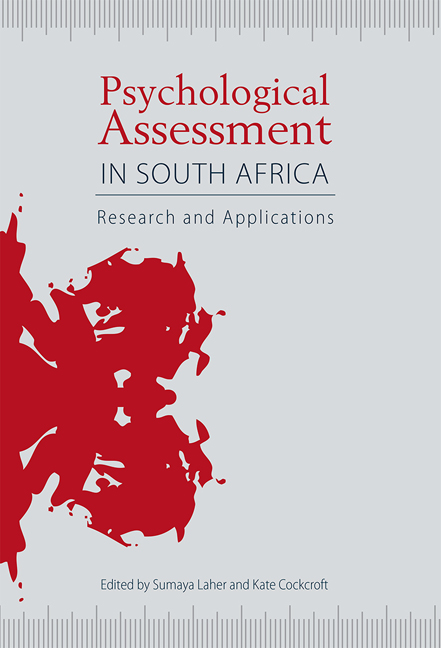Book contents
- Frontmatter
- Contents
- Tables and figures
- Acknowledgements
- Acronyms and abbreviations
- 1 Contextualising psychological assessment in South Africa
- Section One Cognitive tests: conceptual and practical applications
- Section Two Personality and projective tests: conceptual and practical applications
- Section Three Assessment approaches and methodologies
- Contributors
- Index
1 - Contextualising psychological assessment in South Africa
Published online by Cambridge University Press: 21 April 2018
- Frontmatter
- Contents
- Tables and figures
- Acknowledgements
- Acronyms and abbreviations
- 1 Contextualising psychological assessment in South Africa
- Section One Cognitive tests: conceptual and practical applications
- Section Two Personality and projective tests: conceptual and practical applications
- Section Three Assessment approaches and methodologies
- Contributors
- Index
Summary
Psychological assessment in South Africa is a controversial topic primarily, but not exclusively, because of its links to South Africa's troubled past. The history of South Africa is a chequered one, characterised by ethnic and racial interaction, integration and conflict (Heuchert, Parker, Stumpf & Myburgh, 2000). The tribal groups that occupied the country prior to the arrival of white settlers in 1650 followed patterns of merging and splitting that were similar to those in most other parts of the world. Some groups were formed voluntarily and others by conquest and subjugation. In 1652, the ancestors of present-day Afrikaansspeaking South Africans arrived. They were originally mainly of Dutch ancestry, and later also of German and French ancestry. Slaves from the former Dutch colonies in the East (mainly the territories now forming part of Malaysia) were also brought to the Cape at this time. In 1834 all slaves were emancipated. Around the same time a common language developed amongst the groups in the Cape consisting of a mixture of words from the Malay, Khoisan, Portuguese, French and Bantu languages, but with Dutch as a base. Towards the late 19th century this language was recognised as Afrikaans. Although the former slaves spoke the same language (Afrikaans) as the white settlers, after 1948 they were separated into two groups based on skin colour – namely, white Afrikaners and coloured Afrikaners. The other main white group in South Africa consisted of English-speaking South Africans who arrived in the early 1800s with the aim of ‘settling the frontier’ (Heuchert et al., 2000, p.113).
In the 1860s, British settlers recruited indentured labourers from India primarily to man the sugar, tea and coffee plantations in the Natal region. These labourers were promised good wages and the right to settle as free men after five years. The failure to implement the freedom policies for Indians led to Gandhi forming the Natal Indian Congress, the first mass political organisation in South Africa. At the same time, members of the Indian merchant class also came to South Africa and were instrumental in setting up trade in the then Transvaal region of the country.
- Type
- Chapter
- Information
- Psychological Assessment in South AfricaResearch and Applications, pp. 1 - 14Publisher: Wits University PressPrint publication year: 2013



